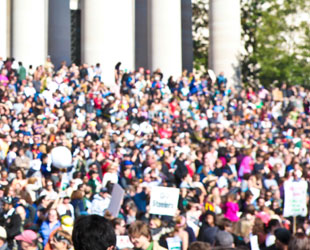The Basic Practice
Doing justice is a central imperative in Judaism, Christianity, and Islam. Buddhists are urged to be socially engaged. Hinduism, Taoism, Confucianism, and primal religions emphasize right relationships within communities as building blocks of justice.
This practice applies to the whole range of human interactions, and today it is also being extended to animals and the environment. It means that we deal fairly with others, recognizing the equality and dignity of all. It requires that we work to insure that all people, especially the poor and the weak, have access to opportunities. It assumes that none of us is free until all of us are.
Practice justice by demanding it. Words can be as forceful as deeds — the prophets of old proved that. Name injustices when you see them. Speak boldly and put your body and your money where your mouth is. Stand up and be counted.
Why This Practice May Be For You
Often we are propelled into the struggle for justice when we experience an injustice ourselves; we are not treated fairly at work or our friendship is exploited by an associate. One day while reading the newspaper, we may be shocked to learn of the treatment of certain groups in our society. Or we may step back and realize that we have been ignoring what are clearly injustices around us. Our very lack of concern can wake us up to the need for justice.
There is also a "shadow" side to this spiritual practice. Sometimes in our fervor for justice we decide that we can ignore the rights and dignity of those who oppose us. Instead of being justice seekers, then, we become fanatics.
Daily Cue, Reminder, Vow, Blessing
- Taking money out of my wallet is my cue to practice justice.
- Whenever I see a poor person, I am reminded of the need for justice.
- Watching a street demonstration, I vow to wage my own fight for justice.
- Blessed is the Great Liberator who calls us to be just in a world of inequality, oppression, and suffering.
